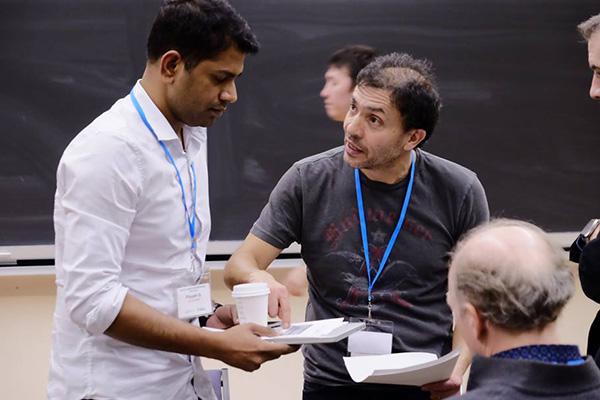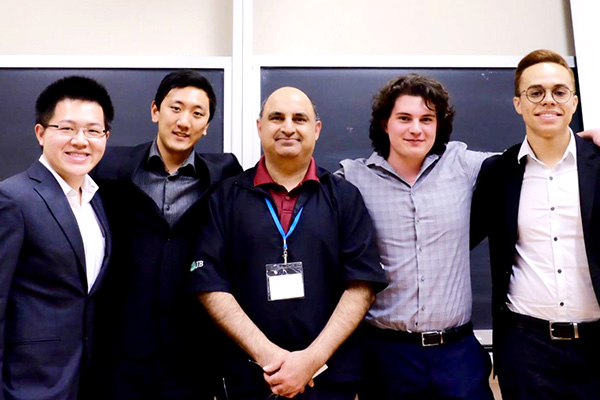
This story originally appeared on U of T Engineering News.
There is only one rule at Hatchery Accelerator weekend: there are no rules.
Fuelled by coffee, snacks and sage advice, on January 22 and 23, students worked furiously to transform their wildest entrepreneurial ideas into viable business models in just 28 hours. The competition, hosted by The Entrepreneurship Hatchery, was kicked off by a special panel presentation from Silicon Valley seed accelerator Y Combinator, the incubator that has launched companies such as Dropbox, Reddit, and Thalmic.
Students worked in teams of four to create viable business models, judged by a panel of industry experts and entrepreneurs, including Isi Caulder (EngSci 8T9), Richard Helbig (GeoE 7T3), Michael Augustanavicous (ElecE 7T6), Dag Enhorning and Richard Louttet. The top team took home a grand cash prize of $2,000, and the runner up won $1,000.
“Accelerator Weekend 2016 was a huge success. One hundred students, 23 teams, six finalists, and two prizes. The 28-hour journey that participants went through is a true representation of the journey of an entrepreneur that normally takes years,” said Joseph Orozco, executive director of The Entrepreneurship Hatchery. “We are excited to see the student’s entrepreneurial spirit growing year after year. “
U of T Engineering News caught up with the two teams that came out on top:
First prize—$2,000: TouchDown

Team TouchDown with their Hatchery mentor, Naresh Bangia, at centre. (courtesy: Sam Fang).
Members: Kyle Bimm (Year 2 MechE), Bryan De Bourbon, Sam Fang (Year 3 IndE), Bowen Wu(Year 3 Civil)
Elevator pitch: TouchDown is a parking management system to streamline parking for customers commuting into large cities. The system uses physical modules with Google Maps integration to help commuters find a registered parking spot before they start driving. After a quick selection, their parking space is booked and paid for, via in-app purchase, so commuters no longer have to worry about their parking situation once they start driving. This eliminates time wasted and money spent looking for parking for commuters as well as eliminates unnecessary parking enforcement for municipalities.
What problem does TouchDown solve?
Bryan: As a student that has to regularly commute between the Misssissauga (UTM) and the St.George Campus (UTSG), I became frustrated in my ability to make it on time to UTSG while still in my car, but still arrive 10 to 20 minutes late to my planned events because of the inability to find parking quickly and easily while driving around campus at saturated times. I thought “what if there was a system to allow me to see readily available parking spots before I even planned my route?” With a few more iterations we arrived at TouchDown!
What challenges did your team overcome during the competition?
Kyle: The team faced several challenges over the course of the competition that required a substantial amount of pivoting. The first obstacle we faced was the discovery of existing competition rather late on the first day. Hours spent scouring the internet for existing solutions to the problem proved little was being done in North America, and almost nothing in Canada in the way of smart parking. Upon research into parking related ideas for the company, after many other teams had already called it a night, we stumbled upon several different services that had flown under the radar up until that point. This forced us to rethink our business model and re-establish ourselves as an innovator in the parking world. We decided to create an all-in-one parking system that could not only link parking spot owners and commuters, but enhance security in commercial facilities and eliminate the need for regular, manned parking enforcement. The second challenge the team encountered was the strict regulations involving parking in private facilities like condos that require key access. This, coupled with the lack of previous information available on partnerships between parking services and commercial organizations, motivated the team to design the product launch with mainly the typical “house and driveway” consumer in mind, as a beta launch of sorts. Once a desire for the service was proven in the market, we would have the necessary backup to approach larger scale operations about joint business ventures with confidence.
What’s next for Touchdown—will you all continue to work on the business?
Team: All of us are considering the practicality of the project in industry given the availability of necessary technology and regulations currently in place. As of now time constraints among the group seem to be the biggest issue to get TouchDown to market, but we all are super excited about trying to do so.
Runner up—$1,000: Aurum
Members: Bonny Khanna (MechE 1T5), Min Lee, Rod Parsa, Lucas Huang
Elevator pitch: Aurum is a noise-cancelling product that dampens the constant background buzz we all hear while living and working in a city like Toronto.
What problem does Aurum solve?
Rod: Studies have shown that noise pollution has adverse health effects including higher stress levels, sleep disturbance, hypertension and tinnitus. Most of us go about our days without giving it a second thought, only to wonder why we aren’t working as hard as we’re capable of doing, or wake up groggy in the mornings. Furthermore, noise pollution has been linked to a 10-per cent decrease in housing prices in dense cities. Aurum solves this problem by bringing active noise cancellation to your living room, bedroom or office, creating an aura of tranquility conducive to studying, sleeping or just relaxing. This technology has already been put to use on a large scale in certain commercial aircrafts (where engine noise is a concern), as well as on a small scale in popular noise-cancelling headphones like the Bose QC series. Aurum bridges the size gap and creates a solution that doesn’t necessitate the use of bulky headphones or expensive installations. We came up with the idea when my teammate Bonny mentioned that ever since he had moved closer to a subway line, he’d had trouble sleeping. We did a bit of brainstorming and realized that short of expensive, thick, sound-proof glass windows, there was no real solution out there – we’d all have to suck it up if we wanted to live in the city.
What challenges did your team overcome during the competition?
Rod: I don’t think there were any major hiccups, maybe just a few minor ones. Our greatest concern was that we couldn’t show the judges any sort of proof of concept. Unlike many other app-based ideas, a product like ours may require millions in R&D before its viability can be ascertained. Nonetheless, we were confident in the value that it offered, should it come to fruition; nearly everyone who heard about our idea wanted one and was willing to pay hundreds of dollars for a working solution. In the short context of the 28-hour marathon, we figured we’d make promises first and apologize later.
What’s next for Aurum—will you all continue to work on the business?
With regard to the future, we’re considering applying for the Hatchery summer incubator program. Our mentor Rob Klein is very supportive of us, and it would allow us to get started on a functional proof of concept in the form of a primitive prototype.
Students from across the University of Toronto can apply to participate in the Hatchery Incubator summer internship program. Deadline to apply to the 2016 cohort is Jan. 31, 2016.